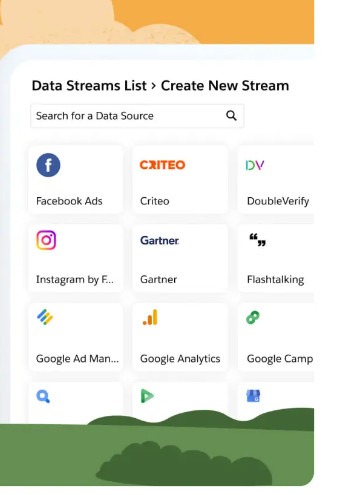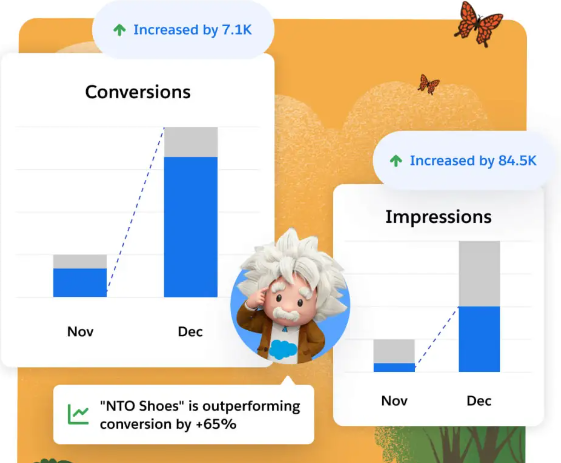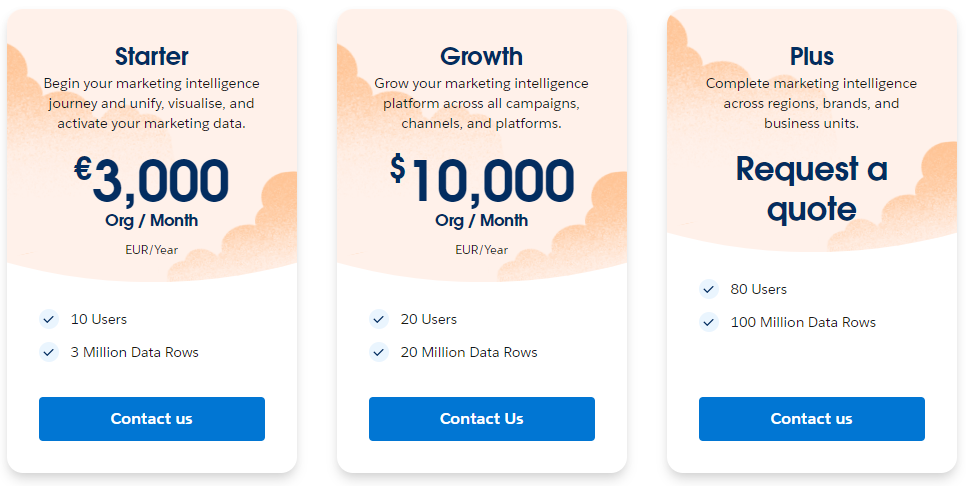Salesforce Marketing Cloud Intelligence is a marketing analytical software that provides a 360-degree view of customer data for easy analysis of campaign performance across multiple channels. It helps turn raw data into powerful insights that inspire the creation of effective campaign strategies for optimal outcomes.
At the heart of this analytical software is the AI-driven tool Einstein. This tool can be used to improve specific KPIs by offering ongoing actionable insights and drilling deeper into data for comprehensive insights.
Salesforce is compatible with many apps, so a smooth integration into existing systems and workflows is guaranteed. Whether you are dealing with CRM, marketing automation, analytics, or finance apps, the software ensures an easy onboarding process that doesn’t disrupt business operations.
Salesforce Marketing Cloud Intelligence Functionality
Salesforce has robust features that enable it to deliver data analytics services more efficiently. Check them out below:
- Data integration: brings data from different platforms in one place to give you a complete view of your marketing performance. You can identify marketing channels that generate more revenues and capitalize on them.
- Data connectors: can sync with 170+ connectors for importing data from advertising, CRM, commerce, and big data analytics tools (e.g., BigQuery and Amazon Redshift). The connectors are automatic and maintained by Salesforce, so integrating data only takes minutes.
- Custom dashboards: includes dashboards with prebuilt widgets; you can also create your own custom widgets if you want. With the dashboards, it’s easier to track metrics related to web traffic analytics, sales, marketing, customer relationships, and more.
Salesforce Marketing Cloud Intelligence Data Transfer

The platform provides several options for transferring data, including:
- File-based integrations: you upload data files in Excel, CSV, or other platforms directly to the software.
- APIs: there are thousands of API connectors you can use to link a wide range of data tools to Marketing Cloud Intelligence.
- Data cloud connector: this syncs data from multiple sources into the Salesforce Data Cloud, providing a single, unified view of customer data, which is refreshed daily.
- Third-party integrations: this entails using ETL tools to connect data sources to Salesforce. They automate the process of extracting, transforming, and loading data, ensuring data is transferred to Salesforce fast for unified analysis.
Salesforce Marketing Cloud Intelligence Reporting

You can create reports based on the data integrated within Salesforce Marketing Cloud Intelligence to gain insights into audience engagement, customer performance, ROI, and more. The platform allows you to generate data reports where data is showcased in a CSV, Excel, TXT, or TSV file. Visual reports are also supported and mainly feature a screenshot of a dashboard page, which can be exported as a PDF, PNG, or PPT file.
Reports can be sent to others based on the set schedule (daily or weekly) and delivered via email, Google Cloud Storage, AzureBlob, FTPS, Google Drive, etc. The reports normally appear on the reports list after they are created, which makes it easy for you to edit, delete or create copies.
Salesforce Marketing Cloud Intelligence Customer Support
When you need assistance navigating the platform, you can always visit the help center. It features extensive online documentation, tutorials, and FAQs to help troubleshoot common issues. You can also contact the expert team by scheduling a direct call. This is a viable option, especially if you want to discuss your business needs in detail.
Community forums are available, too. They are ideal for interacting with other users and seeking advice on a range of issues, including dashboard customization, analytical tools, feature utilization, and more. Other support options include a live chat, ticket submission, and interactive learning modules.
Reviews on Salesforce’s customer support are generally positive, with most praising it for offering top-notch services. Here’s an example of a positive review on customer support:

Salesforce Marketing Cloud Intelligence Price Breakdown
Salesforce Marketing Cloud Intelligence offers flexible plans, with prices starting from €3,000/month and all editions offering premium support.
Salesforce Marketing Cloud Intelligence Free Trial
Like other marketing analytics tools, the platform includes a free trial plan but lasts for a longer period—30 days. It includes several features, such as pre-loaded data for exploring the platform’s features, online training, and onboarding webinars.
You can also watch demos to learn more about the software’s capabilities and explore its suitability for your organization before committing. If you are eyeing specific offers, it’s best you consult with the sales team directly.
Salesforce Marketing Cloud Intelligence Price Packages

Users, including data analysis companies, have three main packages to choose from. The overall cost incurred boils down to the number of direct users needed and data row consumption.
- Starter (€3,000/month): Ideal for small to mid-sized businesses or teams, this plan gives access to basic tools needed to onboard, integrate, and visualize marketing data. You can onboard a maximum of 10 users, including 2 administrators, for controlled access. You also receive harmonization and marketplace features.
- Growth (€10,000/month): Retail chains, e-commerce platforms, high-growth tech firms, and digital marketing agencies requiring robust data management and advanced analytics can greatly benefit from this package. It offers more workspaces and data rows and doubles the number of users you can add.
- Plus (Request a quote): It usually targets larger organizations with extensive data needs and complex marketing strategies. However, the price isn’t indicated upfront; you have to contact a sales representative to get a customized quote, depending on what you want.
Salesforce Marketing Cloud Intelligence Customer Reviews
The overall sentiment toward this software is positive. Users frequently highlight its ease of use, powerful analytics, and robust data management capabilities as key reasons they love Salesforce. However, common challenges include a steep learning curve and high pricing. Let’s check some of the reviews below:

This review asserts Salesforce’s powerful data integration capabilities, intuitive dashboards, and AI-driven insights that make performance analysis a breeze.
Justifiably so, Salesforce offers pre-built connectors and APIs to support easy integration with numerous sources. It also delivers AI-powered forecasts and recommendations, enabling you to spot trends and make data-driven decisions.

The user reveals that the platform is easy to use. While this may be true for users familiar with the software’s features, beginners, especially smaller organizations with no robust tech support, navigating Salesforce’s learning curve may be steep. In this case, online training and working closely with experts may be helpful.
Salesforce Marketing Cloud Intelligence Pros and Cons
| Pros | Cons |
| Comprehensive data integration: syncs with numerous data sources. | Costly: the pricing plans are relatively expensive compared to other data analysis tools. |
| Positive customer reviews: most clients are satisfied with its services. | Steep learning curve: navigating the platform can be complex for new users who lack adequate training. |
| Free trial: offers a number of features for free for 30 days | |
| Flexible: provides customizable dashboards and allows users to create their own widgets. |
Verdict
There’s no doubt that Salesforce Marketing Cloud Intelligence is one of the great business analytics tools around. It’s effective and eliminates the hassle of analyzing marketing data from multiple channels separately, saving you valuable time and effort.
With its pre-built connectors, data transfer becomes seamless, and the inclusion of APIs allows for easy integration with unsupported data sources. However, the pricing packages can be quite steep, potentially overwhelming solopreneurs and growing businesses with limited budgets.





Leave a Reply